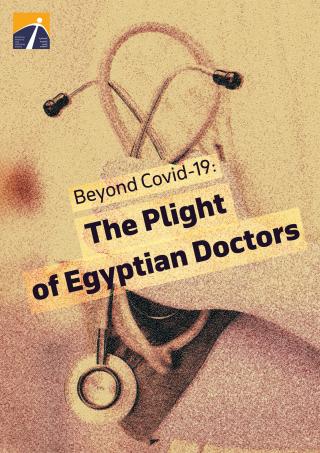Tags: COVID-19 pandemic
This is the English edition of the EIPR research paper titled "Egyptian social protection policies in response to the COVID-19 pandemic... considerable efforts with limited impact", which was published in Arabic language last October.
The Egyptian Initiative for Personal Rights (EIPR) issued a policy paper entitled “Before and after Covid… the plight of Egyptian doctors”, which reviews the problems faced by physicians in particular and medical teams in general in Egypt, and pro
Lack of retention of Egyptian doctors is a crucial issue at stake. Investigating the roots of the problem necessitates an extensive situation analysis of doctors’ working environment and conditions, which touches upon other Health System Building Blocks, like Health Financing, Governance and Leadership, Access to Medicines and Service Delivery. Defects in mentioned building blocks mean less incentives for doctors retention in the public sector and, arguably, the country.
Today, February 7th, marks a year since Patrick Zaki - the researcher at EIPR and Master’s student at the University of Bologna- was arrested from Cairo Airport. Since then, he has been on remand detention. Last week, the Third Felonies circuit ordered the renewal of his detention for 45 additional days. In the face of this incomprehensible intransigence EIPR can’t but repeat its demand for the immediate and unconditional release of Patrick Zaki due to the absence of justifications for remand detention and demand the dropping of all charges against him.
EIPR stresses the importance of equitable distribution of vaccines among citizens, and commitment to full transparency in clarifying the basis on which the vaccine will be distributed, because justice and transparency are the way to gain citizens' confidence in responding to the state's directives during the vaccination process of the Covid-19 vaccine.
EIPR will be advocating and supporting the adoption of all global policies that would ensure equitable access to medications, technologies and information for all, during this pandemic and beyond as part of its continuous quest to ensure the insurance of the Right to Health for all.
In the year of the pandemic, as the World Health Organization called it last March, when millions lose their jobs and their basic living, the government chooses to cut spending on food subsidies. Despite the exhaustion of the health system, headed by doctors and nurses in government hospitals, the government chose to complete its neglect of the constitutional minimum spending on health.
Once again the prison administration failed to transfer Patrick Zaki citing a force majeure event. Patrick was scheduled for a detention renewal session on Sunday June 28 that was meant to take place for the first time before a Criminal Court panel from a counter-terrorism circuit, which sits at the Tora Subofficers Training Institute. But once again we saw a repeat of what has become the norm over the last three months, following the April 28 decision by the head of the Cairo Appellate Court to resume detention renewal sessions without the presence of defendants in criminal cases
The Egyptian Initiative for Personal Rights (EIPR) called on the Ministry of Interior and the Prisons Authority to assume their legal responsibility in providing the simplest forms of human contact in light of the continued suspension of visits for prisoners’ families, consistent with the rights stipulated in the Prison Regulation Law. EIPR demanded that the ministry and the Prisons Authority allow detainees and prisoners to communicate with their families and lawyers.





